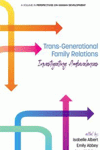
Trans-Generational Family Relations
Investigating Ambivalences
Edited by:
Isabelle Albert, University of Luxembourg
Emily Abbey, Ramapo College of New Jersey
Jaan Valsiner, Niels Bohr Professor of Cultural Psychology, Aalborg University
A volume in the series: Perspectives on Human Development. Editor(s): Isabelle Albert, University of Luxembourg. Jaan Valsiner, Niels Bohr Professor of Cultural Psychology, Aalborg University. Koji Komatsu, Osaka Kyoiku University.
Published 2018
The present volume deals with the experience of ambivalence in family relations - a well-known phenomenon that has inspired more and more research and theorizing in the last years but that is however sometimes difficult to capture.
Bringing together junior and senior researchers from different parts of the world, ideas on theory and research are elaborated following qualitative and quantitative approaches. This book thus contributes to theory-building as well as outlining research results and helping to develop measurement in interpersonal and intergenerational relations.
CONTENTS
Series Editor’s Foreword. General Introduction: Looking at Relations Across Generations: Ambivalence in Context. PART I: CONCEPTUAL ISSUES: AMBIVALENCE AND ITS STUDY. Tensegrity as Existential Condition: The Inherent Ambivalence of Development, Luca Tateo. The Research Act: Creating Knowledge From the Not (Yet) Known, Eugenia Gouvedari. PART II: LIFESPAN AND TRANSGENERATIONAL FOCUS. Multilevel Approach to Ambivalence in Family Sphere: Changing Structures, Roles, and Relationships, Kairi Kasearu, Kadri Raid, and Dagmar Kutsar. Ambivalence in the Family Transmission of Values: Asumming Similarity and Recognizing Differences, Daniela Barni and Silvia Donato. Anticipatory Recognition: Creating a Cycle of Flexible Meanings in Intergenerational Relations, Elsa de Mattos. Adolescents’ and Emerging Adults’ Experience of Ambivalence Toward Parents During the Process of Individuation: Being Caught Between Autonomy and Relatedness? Isabelle Albert and Dieter Ferring. Dynamic Relations Between Perceived Parental Responsiveness, Experiences of Ambivalence, and Self-Esteeem Development in Adolescence, Annekatrin Steinhoff and Marlis Buchmann. Emotional Ambivalence in Adult Children of Care-Dependent Older Parents: Heuristic Impulses From Cognitive-Motivational Emotion Theories, Thomas Boll. PART III: EXPERIENCING AMBIVALENCE: FOCUS ON PHENOMENA. Ambivalence When Family Values Change: Development of New Values in the Perspective of Sociocultural Global “Advancement”, Maliina Lyberth. Transgenerational Ambivalence in the Time to Come: How Meanings Regulate Being Pregnant and Facing Miscarriage, Vívian Volkmer Pontes and Lívia Mathias Simão. Saudade: A Unique Feeling Within the Lusitanian Soul, Stephanie Barros Coimbra and Gaby Marinho Ribeiro. Desired Ambiguities and Dealing With Ambivalences in the Context of Social Work, Mogens Jensen. Your Duty Toward My Right: Ambivalent Traps of Rights and Duties, Kevin R. Carriere. PART IV: MEASURING AMBIVALENCE. Attachment Ambivalence: The Concept, Psychological Importance, and Measurement Issues, Katarzyna Lubiewska. PART V: GENERAL CONCLUSIONS. Transcending Ambivalence: Overcoming the Ambiguity of Theory and Practices, Jaan Valsiner, Isabelle Albert, and Emily Abbey.
-
Paperback978-1-64113-082-0
Web price: $45.04 (Reg. 52.99)
-
Hardcover978-1-64113-083-7
Web price: $80.74 (Reg. 94.99)
- eBook978-1-64113-084-4

- PSY007000 - PSYCHOLOGY: Clinical Psychology
- PSY039000 - PSYCHOLOGY: DEVELOPMENTAL: General
- PSY031000 - PSYCHOLOGY: Social Psychology
-
 Children and Money
Cultural Developmental Psychology of Pocket Money
Children and Money
Cultural Developmental Psychology of Pocket Money
-
 Collected Papers on Inner Speech
Collected Papers on Inner Speech
-
 Digital Developments
Perspectives in Psychology
Digital Developments
Perspectives in Psychology
-
 Families and Family Values in Society and Culture
Families and Family Values in Society and Culture
-
 Family Formation Among Youth in Europe
Coping with Socio-Economic Disadvantages
Family Formation Among Youth in Europe
Coping with Socio-Economic Disadvantages
-
 Particulars and Universals in Clinical and Developmental Psychology
Critical Reflections - A book honoring Roger Bibace
Particulars and Universals in Clinical and Developmental Psychology
Critical Reflections - A book honoring Roger Bibace
-
 Vygotsky’s Pedology of the School Age
Vygotsky’s Pedology of the School Age

